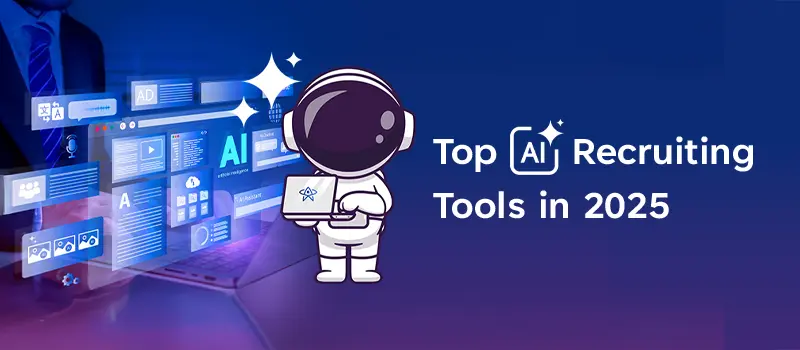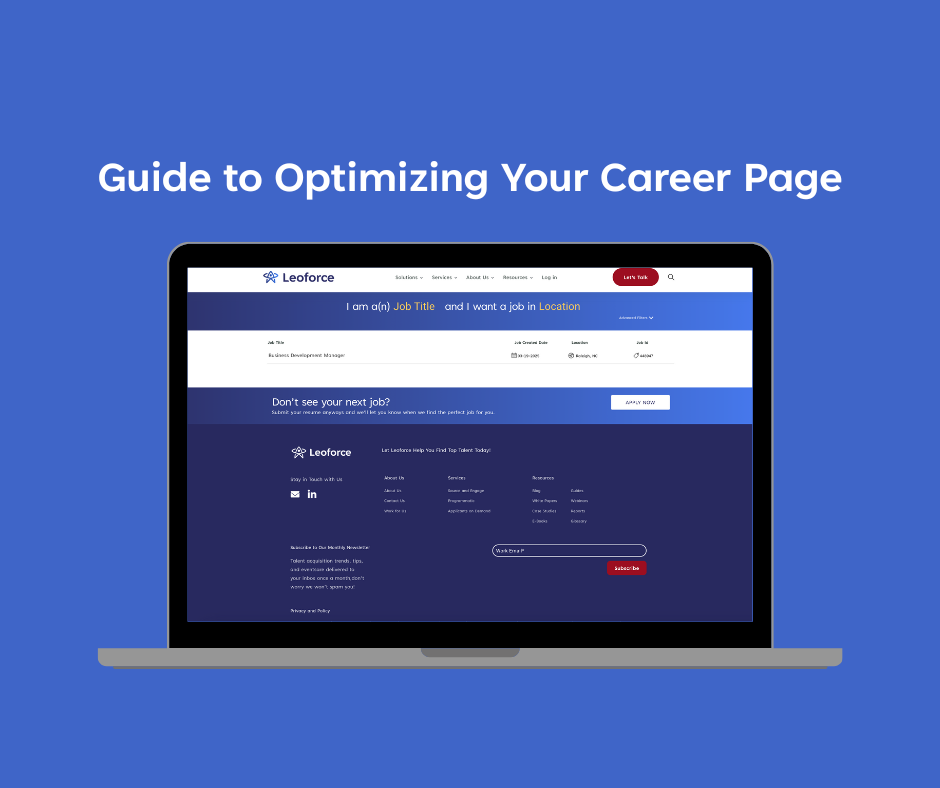How to achieve your talent acquisition goals using AI in 2024

Effectively navigating today’s evolving talent acquisition landscape requires recognizing the transformative impact of advanced AI tools and revisiting talent acquisition goals to align with this paradigm shift. Organizations are increasingly acknowledging this reality, leading to a significant change in the investment landscape.
Forbes reports that 61% of companies are gearing up to increase their commitment to talent acquisition, with a dedicated budget specifically earmarked for AI-powered recruiting tools.
This article delves into talent acquisition objectives and 2024 talent strategies, aiming to redefine how organizations approach their recruitment goals. Let’s explore the profound impact of AI in recruitment, and dissect S.M.A.R.T goals for recruiters required for hiring and retaining top-tier talent.
1. Emphasizing skill based hiring
Skill-based recruitment, at its core, emphasizes assessing candidates based on their specific competencies and capabilities rather than solely relying on conventional qualifications and previous work experience. Globally, 73% of companies used skills-based hiring in 2023. It goes without saying that this dramatic shift in the talent acquisition landscape demands an urgent need to switch to AI based skill assessment tools for better efficiency.
Leveraging advanced AI tools enables organizations to conduct comprehensive and efficient evaluations, identifying and quantifying the precise skill sets that align with the requirements of the role.
The integration of AI skill assessment in talent acquisition strategies enhances the precision and objectivity of competency evaluations.
Leoforce by Leoforce profiles talent and jobs using more than 300 attributes, many ignored by conventional AI. These features not only allow efficient shortlisting of skill based candidates but also push candidates that are more likely to succeed in the role. Know more, Request a Demo.
2. Leveraging AI for brand building
Employer branding transcends the traditional recruitment process, evolving into a nuanced identity that resonates with potential candidates, shaping a positive perception of an organization.
Here, AI marketing tools contribute significantly to brand perception analysis, offering organizations insights into how they are perceived in the market. These sophisticated tools, which include AI brand analytics, go beyond conventional strategies. Through sentiment analysis, social media monitoring, social listening, and other AI-driven metrics, organizations can delve deep into the collective perception of their brand.
This data-driven approach not only highlights strengths but also identifies areas for improvement, facilitating informed decisions to fortify the employer brand. The integration of reputation management and AI brand analytics ensures that organizations not only understand their current standing but also strategically enhance their image in the competitive talent market.
3. Maintaining engagement with second-choice candidates
Candidate engagement is a critical aspect that extends beyond the initial hiring process. Organizations recognize the value of nurturing relationships with near-hire candidates who, although not selected for a specific role, possess valuable skills and potential for future positions.
AI communication tools play an important role in this engagement strategy. Leveraging the capabilities of artificial intelligence allows organizations to personalize communication with second-choice candidates. Automated yet personalized messages, tailored to individual skills and interests, create a positive and lasting impression. This not only maintains a connection but also positions the organization favorably in the candidate’s mind for future opportunities.
Talent pool management is another facet of AI-enhanced candidate engagement. Through sophisticated algorithms, organizations can efficiently categorize and manage potential candidates, ensuring a streamlined and strategic approach when future roles become available.
Leoforce by Leoforce offers instant access to more than 150 million active job seekers and 650 million passive candidates, consolidating them from all sources into one easy-to-manage interface, making it easy to rapidly review, shortlist and engage candidates. Know more, Request a Demo.
4. AI for inclusive recruitment
Inclusive recruitment strategies empowered by AI bias reduction tools have the capability to extend beyond bias prevention. Advanced tools enable organizations to reach a broader and more diverse candidate base. Through targeted algorithms, recruitment platforms can identify and engage with candidates from various demographics, creating a pipeline that reflects the richness of diversity.
AI tools like Leoforce by Leoforce offer built in diversity indicators that will help eliminate bias but ensure that a diverse talent pool is created based on talent assessment, skills and experience. Request a Demo to know more about integrating diversity hiring goals with talent acquisition goals in 2024.
Moreover, AI facilitates the optimization of job descriptions and requirements to attract a wider range of applicants. By analyzing language and content, these tools ensure that the messaging is inclusive and appeals to a diverse audience.
5. AI-driven referral analysis
Employee referral programs are recognized as invaluable assets in talent acquisition and are an integral part of talent acquisition goals, leveraging existing networks to identify potential candidates. AI steps into this realm to enhance and optimize the referral process. AI-driven referral tracking tools provide organizations with in-depth insights into the performance of their referral programs.
Incentive management is another area where AI brings significant value. By leveraging AI tools, organizations can tailor their incentive structures to maximize engagement and participation in the referral program. These tools analyze data on successful referrals, helping organizations design incentive programs that are not only attractive but also strategically aligned with the overall talent acquisition goals.
6. AI-powered internal talent mobility
In the realm of talent acquisition goals, internal career progression takes the spotlight, propelled by AI-powered strategies. Nielsen findings reveal that lateral moves increase an employee’s likelihood of staying within the organization for the next 12 months by 48%.
Recognizing this trend, companies are turning to AI-driven internal mobility solutions for building talent pools and utilizing internal talent marketplaces to match employees with new opportunities. These platforms, fueled by advanced AI job matching algorithms, meticulously analyze skills and preferences, fostering dynamic career growth within the organization.
This data-driven strategy, encompassing internal mobility initiatives and AI career pathing, not only enriches the employee experience but strategically contributes to talent acquisition goals and objectives. It actively embraces a culture of continuous development, enhancing both satisfaction and employee retention.
By leveraging AI to facilitate internal career progression and implementing effective AI career pathing, organizations tap into their existing internal talent marketplace, creating a dynamic and responsive approach that precisely aligns with evolving skills and aspirations. This holistic approach not only benefits individual career growth but also optimally supports the overarching talent acquisition strategy.
7. Streamlining processes with automation
Recruitment automation plays a crucial role in identifying and eliminating routine administrative tasks. By leveraging AI efficiency, organizations can automate repetitive aspects of the recruitment process, from resume screening to interview scheduling. This not only accelerates the hiring cycle but also allows human resources professionals to focus on other aspects of talent acquisition goals and objectives including strategic decision-making and candidate engagement.
The benefits of AI in administrative work reduction extend beyond efficiency gains. With recruitment automation, the emphasis shifts from time-consuming administrative tasks to cultivating meaningful interactions with candidates. This fosters a more personalized and engaging recruitment experience, contributing to a positive employer brand and enhancing the overall success of talent acquisition strategies.
8. AI for communication consistency
Consistent and timely communication with job applicants is integral to successful talent acquisition. AI plays a crucial role in ensuring communication consistency through innovative tools such as AI chatbots and automated messaging systems. These technologies streamline candidate interactions, providing real-time updates on application status, interview schedules, and other relevant information.
The use of AI chatbots not only enhances efficiency but also contributes to a positive candidate experience by delivering clear and prompt communication throughout the recruitment process. Candidate communication, thus powered by AI tools, becomes impertinent for a transparent and engaging relationship between organizations and prospective hires.
Leoforce by Leoforce offers a convenient and consolidated dashboard that can be used to engage talent using automated messaging systems like call, text, email and a helpful chatbot. Know more, Request a Demo.
9. Empowering managers with AI tools
Empowering hiring managers with collaborative AI tools is a transformative approach in achieving collaborative hiring decisions. Providing effective training to hiring managers ensures they can leverage AI recruitment tools to their full potential.
This two-way collaboration not only streamlines the recruitment process but also enhances decision-making support by integrating AI insights. By embracing hiring manager empowerment and utilizing collaborative AI tools, organizations foster a dynamic synergy between recruiters and managers, optimizing the overall talent acquisition process.
10. Maximizing efficiencies for higher conversion
Maximizing efficiency for higher conversion rates in recruitment is a strategic goal achievable through the utilization of AI analytics. These tools provide insightful data on the recruitment process, allowing organizations to understand and enhance conversion rates effectively.
By focusing on conversion rate optimization and leveraging the power of AI analytics, recruitment strategies can be fine-tuned, leading to improved efficiency and successful outcomes. In some instances, organizations have witnessed remarkable recruitment success stories through the integration of AI, showcasing the tangible benefits of strategic analytics in achieving talent acquisition goals and objectives.
11. Reduce time to hire
An important goal of any talent acquisition strategy is time-to-hire reduction. Reducing the time to hire can make or break an organization in today’s competitive talent acquisition landscape. The significance of expediting the hiring timeline is underscored by the efficiency gains achieved through AI tools. These technologies optimize screening and interviewing processes, ensuring a quick and effective hiring process.
Leoforce by Leoforce streamlines hiring and slashes shortlisting time by an impressive 50% facilitating quick hiring processes. Request a Demo. With a focus on time to hire reduction, AI screening efficiency, and a swift hiring process, organizations can secure top talent efficiently and maintain a competitive edge in recruitment.
12. Enhancing candidate experience
Enhancing the candidate experience is pivotal in today’s recruitment landscape, and AI is a key player in crafting engaging recruitment journeys. By leveraging AI personalization, organizations can tailor the candidate journey to individual preferences, creating a more personalized and meaningful experience.
Additionally, utilizing AI for recruitment feedback allows for valuable insights into the recruitment process, enabling continuous improvement. The synergy of candidate experience, AI personalization, and strategic feedback mechanisms ensures a positive and dynamic recruitment journey for prospective hires.
13. Fostering long term employee engagement
Fostering long-term employee engagement begins with strategic new hire retention efforts. Prioritizing candidates who align with the organization’s long-term goals is crucial. Here, AI predictive analytics plays a significant role in forecasting candidate success and retention.
By leveraging these insights, organizations can make informed decisions that enhance new hire retention and overall employee engagement. The synergy of new hire retention strategies and AI predictive analytics ensures a workforce that not only excels in the present but also contributes to long-term organizational success.
Leoforce by Leoforce offers Artificial Intuition that analyses and predicts candidates that are likely to succeed within an organization and thereby stay in their role for a longer period. Know more.
14. Optimizing recruitment budget
Efficiently managing a recruitment budget requires a delicate balance between securing quality hiring and cost-effective hiring. Striking this balance involves strategic decision-making, and AI tools play a vital role in analyzing and optimizing the budget.
Organizations can make judicious choices to maximize their budget’s impact while maintaining the desired quality in hiring. Incorporating AI budget tools enhances this process with data-driven insights, allowing for thorough analysis and empowering organizations to create effective and economical recruitment strategies.
15. Accessing international talent pools
Expanding a global talent reach involves strategic approaches to tap into international talent pools. Organizations can employ cross-cultural recruitment strategies to connect with diverse candidates worldwide.
AI plays an important role in overcoming geographical and cultural barriers in recruitment, ensuring a seamless and efficient global talent acquisition process. Through AI global reach initiatives, organizations can identify, engage, and attract top-tier talent from across the globe, fostering a diverse and dynamic workforce that aligns with the evolving demands of the global market.
16. Embracing the remote workforce
Embracing the remote workforce involves integrating remote hiring practices seamlessly into an organization. AI tools play a vital role in this transition, assisting in remote candidate assessment and onboarding. Organizations are adapting to the rise of remote work in talent acquisition by leveraging virtual assessment techniques and incorporating AI into onboarding processes.
Through remote hiring, virtual assessment, and AI onboarding, organizations can navigate the evolving landscape of remote work, ensuring effective talent acquisition and successful integration of remote team members.
17. Building a learning culture in recruitment
Fostering continuous learning and development is integral to building a thriving learning culture within organizations. Recognizing the significance of continuous learning opportunities is pivotal for attracting top talent.
AI plays a crucial role in this domain by conducting skill gap analyses and recommending personalized learning paths. Through continuous learning initiatives, skill gap analysis, and AI-driven learning paths, organizations can create an environment that not only attracts but also retains top-tier talent, ensuring ongoing growth and adaptability in today’s dynamic work landscape.
18. Develop agile recruitment strategies
In navigating the dynamic landscape of talent acquisition, developing an agile recruitment strategy becomes necessary. The evolving recruitment dynamics necessitate a keen understanding of the need for agility and flexibility in adapting to market changes. AI tools emerge as instrumental allies in this endeavor, providing real-time market insights and facilitating trend analysis to inform and refine recruitment strategies.
Agile Recruitment, as a strategic approach, acknowledges the fluid nature of the talent market. Organizations need to swiftly adapt to emerging trends, changing candidate expectations, and evolving industry demands. The incorporation of AI tools enhances this agility by offering precise market insights. AI-driven trend analysis not only keeps organizations informed about the latest developments but also enables proactive adjustments to recruitment strategies, ensuring they stay aligned with the current dynamics of the talent landscape.
19. Enhance recruitment marketing
As talent acquisition goals and objectives evolve, the convergence of marketing and recruitment strategies becomes increasingly evident in order to offer a dynamic approach to attract and engage top-tier candidates. At this intersection, AI tools become instrumental in executing targeted recruitment marketing and optimizing candidate outreach.
AI marketing tools can revolutionize how organizations connect with potential candidates. By leveraging advanced algorithms and data analytics, organizations can precisely identify and target the right audience. These tools enable the creation of personalized and compelling campaigns, ensuring that recruitment messages resonate effectively with the intended candidates.
Candidate outreach, a critical component of the recruitment process, also benefits immensely from AI tools. Smart automation and personalized communication powered by AI enhance the outreach strategy. From initial contact to nurturing candidate relationships, AI-driven tools streamline the process, ensuring efficient and effective engagement throughout the candidate journey.
20. Leverage data-driven recruitment
Leveraging data-driven strategies can prove to be a game-changer in steering recruitment decisions with precision and foresight and organizations are starting to understand this insight. The crux of this approach lies in recognizing the pivotal role of analytics in shaping recruitment strategies and the transformative impact that artificial intelligence (AI) brings to the realm of recruitment data.
Data-driven recruitment, powered by AI analytics, goes beyond traditional methods, offering a wealth of actionable recruitment insights. Organizations can harness the power of recruitment data to inform decisions at every stage of the hiring process. AI algorithms sift through vast datasets, providing nuanced and predictive analytics that guide strategic recruitment initiatives.
The importance of data-driven recruitment is underscored by its ability to enhance decision-making, streamline processes, and optimize candidate experiences. AI analytics not only decode patterns within recruitment data but also forecast trends, empowering organizations to stay ahead in the dynamic talent acquisition landscape.
Measuring success with S.M.A.R.T goals
Crafting S.M.A.R.T (Specific, Measurable, Achievable, Relevant, Time-bound) recruitment goals is a strategic imperative in talent acquisition. This framework provides a clear and structured goal-setting strategy, ensuring that objectives are specific, measurable, achievable, relevant to the organizational context, and time-sensitive.
AI tools play a significant role in this process by offering valuable insights and assistance in planning S.M.A.R.T goals. By leveraging AI-assisted goal planning, organizations enhance their capacity to revisit their goal setting strategy, set precise objectives, track progress, and achieve goals within the dynamic and competitive landscape of talent acquisition. This integration of AI ensures a data-driven and strategic approach, optimizing the effectiveness of the S.M.A.R.T framework in meeting recruitment objectives.
In reflecting on Smart Recruitment Goals in 2024, it’s evident that each element of the S.M.A.R.T framework holds immense importance in shaping the future of talent acquisition. The precision of specific goals, the quantifiability of measurable objectives, the realism of achievable targets, the relevance of goals to the organizational context, and the time sensitivity embedded in time-bound aspirations collectively contribute to a robust and strategic recruitment approach.
Final Thoughts
Looking ahead, the future of recruitment is intricately tied to the seamless AI integration. The continuous evolution of AI tools is poised to redefine recruitment strategies, providing organizations with unprecedented insights and efficiency in achieving S.M.A.R.T goals. The outlook for recruitment strategies, coupled with AI integration, signifies a shift towards a more data-driven, strategic, and results-oriented talent acquisition landscape.
As organizations embrace the future of recruitment with AI at its core, the S.M.A.R.T framework will remain a guiding principle, ensuring a dynamic and adaptive approach to meet the evolving demands of the talent market in 2024 and beyond.





